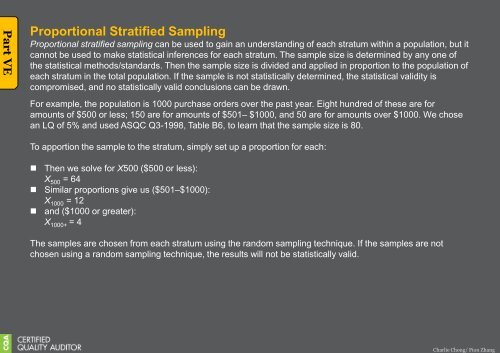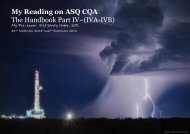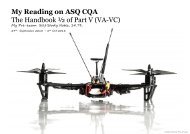My Reading on ASQ CQA HB Part V Part 2
You also want an ePaper? Increase the reach of your titles
YUMPU automatically turns print PDFs into web optimized ePapers that Google loves.
<strong>Part</strong> VE<br />
Judgmental Sampling<br />
Judgmental sampling is a n<strong>on</strong>-probability sampling technique where the researcher selects units to be sampled based <strong>on</strong> their<br />
knowledge and professi<strong>on</strong>al judgment. This type of sampling technique is also known as purposive sampling and authoritative<br />
sampling. Purposive sampling is used in cases where the specialty of an authority can select a more representative sample that<br />
can bring more accurate results than by using other probability sampling techniques. The process involves nothing but purposely<br />
handpicking individuals from the populati<strong>on</strong> based <strong>on</strong> the authority's or the researcher's knowledge and judgment. Example of<br />
Judgmental Sampling In a study wherein a researcher wants to know what it takes to graduate summa cum laude in college, the<br />
<strong>on</strong>ly people who can give the researcher first hand advise are the individuals who graduated summa cum laude. With this very<br />
specific and very limited pool of individuals that can be c<strong>on</strong>sidered as a subject, the researcher must use judgmental sampling.<br />
When to Use Judgmental Sampling<br />
Judgmental sampling design is usually used when a limited number of individuals possess the trait of interest. It is the <strong>on</strong>ly viable<br />
sampling technique in obtaining informati<strong>on</strong> from a very specific group of people. It is also possible to use judgmental sampling if<br />
the researcher knows a reliable professi<strong>on</strong>al or authority that he thinks is capable of assembling a representative sample.<br />
Setbacks of Judgmental Sampling<br />
The two main weaknesses of authoritative sampling are with the authority and in the sampling process; both of which pertains to<br />
the reliability and the bias that accompanies the sampling technique. Unfortunately, there is usually no way to evaluate the<br />
reliability of the expert or the authority. The best way to avoid sampling error brought by the expert is to choose the best and most<br />
experienced authority in the field of interest. When it comes to the sampling process, it is usually biased since no randomizati<strong>on</strong><br />
was used in obtaining the sample. It is also worth noting that the members of the populati<strong>on</strong> did not have equal chances of being<br />
selected. The c<strong>on</strong>sequence of this is the misrepresentati<strong>on</strong> of the entire populati<strong>on</strong> which will then limit generalizati<strong>on</strong>s of the<br />
results of the study.<br />
https://explorable.com/judgmental-sampling<br />
Charlie Ch<strong>on</strong>g/ Fi<strong>on</strong> Zhang

















